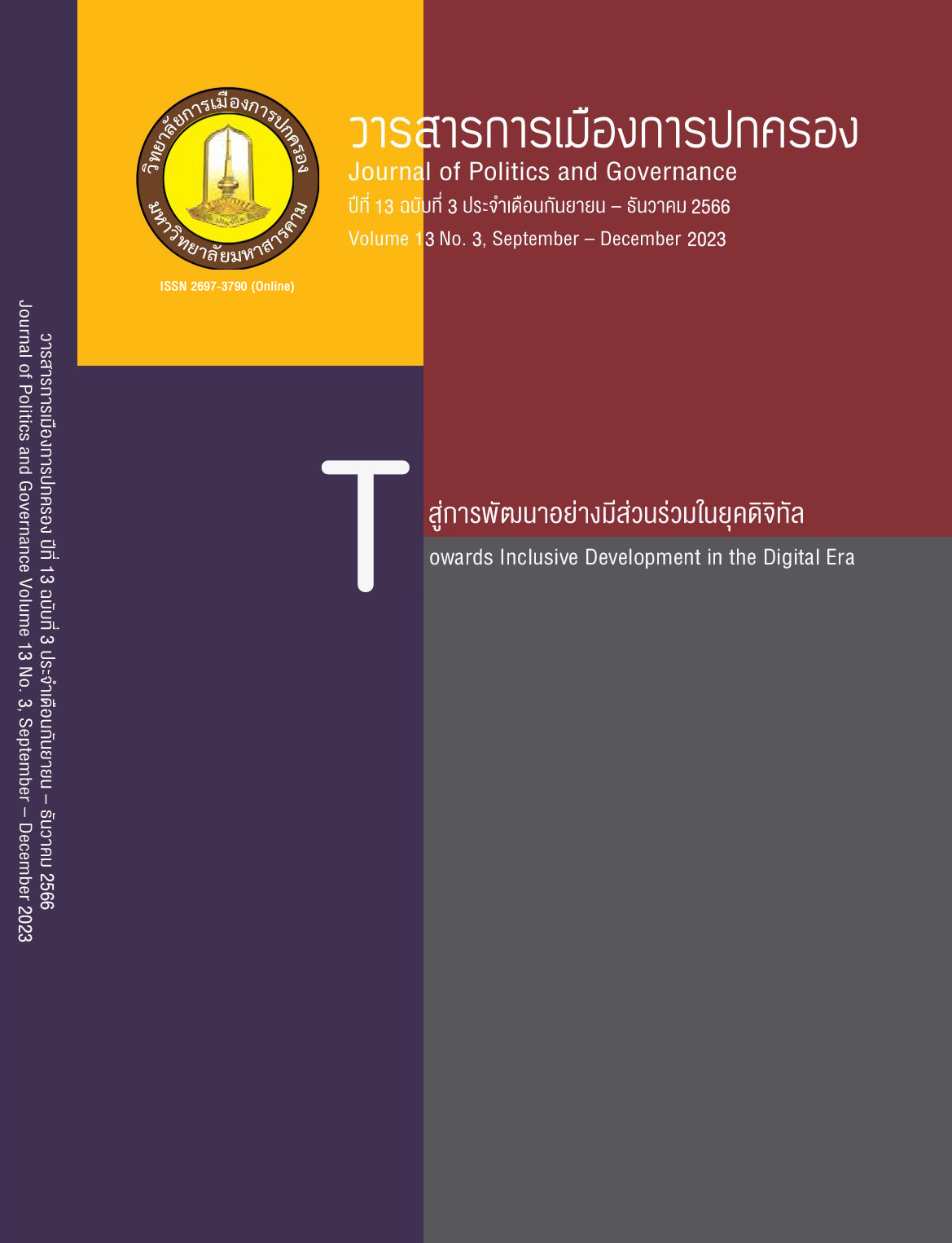The Competency of Ethnic Children and Youth to Build Well-Being Communities for Chiang Mai Province's Indigenous Peoples in the Age of COVID-19
Main Article Content
Abstract
This paper is a result of the project evaluation named "The Competency of Ethnic Children and Youth to Build Well-Being Communities for Chiang Mai Province's Indigenous Peoples in the Age of COVID-19", which was completed in 2021. The evaluation project has three main objectives: output evaluation, outcome evaluation, and impact evaluation. Furthermore, this evaluation study utilizes a combination of quantitative and qualitative research methods. Also, the research aims to study a sample of sixty individuals, comprising children, youth, and project mentors. In addition, the research instruments employed in this study included questionnaires, a focus group discussion, and participant observation. As a result, the research revealed three distinct outputs: firstly, the identification of highly skilled ethnic leaders capable of driving the development and progression of their groups; secondly, the establishment of an integrated mechanism to manage the project; and thirdly, the creation of learning spaces through their practical work experience. Furthermore, this study showed the importance of COVID-19, which had an effect on both outcomes and impacts. COVID-19 plays a significant role in three outcomes: 1) the creation and expansion of children and youth groups; 2) increased time for learning and understanding their community context, focusing on well-being and local wisdom; and 3) the utilization of social applications to implement the project. In addition, COVID-19 has also generated two favorable effects: firstly, it has facilitated the generation of income and the emergence of new employment opportunities through online marketing; secondly, it has provided a platform for businesses to showcase their products online, thereby preserving their local identity.
Article Details

This work is licensed under a Creative Commons Attribution-NonCommercial-NoDerivatives 4.0 International License.
References
ชานนท์ โกมลมาลย์, และคณะ. (2562). รายงานการศึกษา การส่งเสริมให้ท้องถิ่นสนับสนุนสภาเด็กและเยาวชน และกลุ่มเด็กและเยาวชน ริเริ่มทำกิจกรรมสร้างสรรค์ และแก้ไขปัญหาในชุมชน สังคมของตนเอง. กรมกิจการเด็กและเยาวชน กระทรวงการพัฒนาสังคมและความมั่นคงของมนุษย์ และสำนักงานกองทุนสนับสนุนการเสริมสุขภาพ. https://www.dcy.go.th/public/mainWeb/file_download/1646108595063-695155125.pdf
ธาดา วรรธนปิยกุล, ทองอินทร์ ไหวดี, สิงหา จันทริย์วงษ์, และปิยศักดิ์ สีดา. (2565). “บวร” เพื่อการดูแลสุขภาพตนเองของชาติพันธุ์ไทย-ลาว หลังสถานการณ์โควิด-19. วารสารวิชาการสาธารณสุขชุมชน, 8(3), 93-93.
ธานินทร์ คฤหานนท์. (2557). ผลกระทบทางสังคมต่อชุมชนจากการพัฒนาเส้นทางคมนาคมสู่ด่านชายแดนห้วยโก๋น จังหวัดน่าน. วารสารบัณฑิตวิจัยบัณฑิตวิทยาลัย มหาวิทยาลัยราชภัฏเชียงใหม่, 5(2), 37-50.
ปวลักขิ์ สุรัสวดี. (2566). ถอดบทเรียนนักการละครประยุกต์: กระบวนการละครเยาวชนฐานชุมชนเพื่อสร้างการเรียนรู้จิตสำนึกร่วมและอัตลักษณ์จากเรื่องเล่าของเยาวชน. วารสารวิทยาการเรียนรู้และศึกษาศาสตร์, 2(1), 78-120.
ปิยะราช เทพสุภา. (2560). การประเมินโครงการบ้านมั่นคง: กรณีศึกษาชุมชนตาบลบางโปรง อำเภอเมือง จังหวัดสมุทรปราการ (วิทยานิพนธ์ปริญญามหาบัณฑิต, สถาบันบัณฑิตพัฒนบริหารศาสตร์). ThaiLIS. http://libdcms.nida.ac.th/thesis6/2560/b201165.pdf
พงษ์ วิเศษสังข์. (2554). เทคโนโลยีสารสนเทศกับการเปลี่ยนแปลงทางสังคม. วารสารนักบริหาร, 31(1), 124-130.
ภรณี หลาวทอง. (2559). ตัวแบบการพัฒนาเพิ่มขีดความสามารถทางการแข่งขันของวิสาหกิจชุมชนประเภทผลิตภัณฑ์ผ้าและเครื่องแต่งกายในประเทศไทย. (วิทยานิพนธ์ปริญญาดุษฎีบัณฑิต, มหาวิทยาลัยศรีปทุม). ThaiLIS. http://dspace.spu.ac.th/handle/ 123456789/5453
ภารณี นิลกรณ์, และคณะ. (2563). การประเมินผลรูปแบบการป้องกันการใช้สารเสพติดรายใหม่ในเยาวชน โดยความร่วมมือของภาคส่วนที่เกี่ยวข้อง จังหวัดนครปฐม. (รายงานการวิจัย). ศูนย์ศึกษาปัญหาการเสพติด (ศศก.) คณะแพทยศาสตร์ มหาวิทยาลัยสงขลานครินทร์.
เยาวดี รางชัยกุล วิบูลย์ศรี. (2549). การประเมินโครงการ: แนวคิดและแนวปฏิบัติ. สำนักพิมพ์แห่งจุฬาลงกรณ์มหาวิทยาลัย.
วัชรินทร์ คำสา, วรรณรัตน์ ลาวัง, และสมสมัย รัตนกรีฑากุล. (2564). ปัจจัยที่มีอิทธิพลต่อพฤติกรรมการป้องกันโรคหลอดเลือดหัวใจในกลุ่มชาติพันธุ์กะเหรี่ยงที่เป็นกลุ่มเสี่ยงในจังหวัดตาก. วารสารคณะพยาบาลศาสตร์ มหาวิทยาลัยบูรพา, 29(3), 76-89.
ศุภวัฒน์ ปภัสสรากาญจน์. (2559). การนำทฤษฎีการเปลี่ยนแปลงและตัวแบบตรรกะเพื่อการปรับตัวด้านภูมิอากาศ มาใช้ในการพัฒนาชุมชนและท้องถิ่น. วารสารการบริหารท้องถิ่น, 9(1), 41-58.
สมาคมศูนย์รวมการศึกษาและวัฒนธรรมของชาวไทยภูเขาในประเทศไทย. (2563). เอกสารสถานการณ์และสภาพปัญหาโดยรวมของชนเผ่าพื้นเมืองในประเทศไทย. สมาคมศูนย์รวมการศึกษาและวัฒนธรรมของชาวไทยภูเขาในประเทศไทย.
สราวุฒย์ วิจิตรปัญญา, พระศรีพัชโรดม, พระครูสิริพัชรโสภิต, พระปลัดธนเดช สมจิตฺโตพระมนูศักดิ์
อุตฺตโม, นิติกรวิชุมา, และธนกร ดรกมลกานต์. (2565). กระบวนการแก้ไขป้องกันและฟื้นฟูการแพร่ระบาดของโรคโควิด 19 ของกลุ่มชาติพันธุ์ อำเภอเขาค้อ จังหวัดเพชรบูรณ์ ตามแนวทางพระพุทธศาสนา. Journal of Modern Learning Development, 7(7), 233-247.
สฤณี อาชวานันทกุล, และคณะ. (2560). โครงการวิจัยเพื่อพัฒนาองค์ความรู้ด้านการประเมินผลลัพธ์ทางสังคมสำหรับกิจการเพื่อสังคม และจัดทำกรณีศึกษานำร่อง. สำนักงานคณะกรรมการส่งเสริมวิทยาศาสตร์ วิจัยและนวัตกรรม. https://drive.google.com/file/d/16h_aROe7-AnVo2-f_LjQgPCE1XmtbokV/view?pli=1
อภิเชษฐ์ ทับเมือง. (2562). ผลกระทบทางสังคมวัฒนธรรมของเขตพัฒนาเศรษฐกิจพิเศษ จังหวัดสระแก้ว, (วิทยานิพนธ์ปริญญามหาบัณฑิต, สถาบันบัณฑิตพัฒนบริหารศาสตร์).
ThaiLIS. https://repository.nida.ac.th/handle/662723737/5101
เอกชัย ทวีปวรชัย. (2564). แนวทางอนุรักษ์พิธีกรรมทางความเชื่อของชาติพันธุ์เมี่ยนในประเทศไทย: การวิเคราะห์สวอต. วารสารวิชาการ คณะมนุษยศาสตร์และสังคมศาสตร์ มหาวิทยาลัยราชภัฏนครสวรรค์, 8(2), 88-104.
Darwin, C. (1859). The origin of species. Modern Library.
Haferkamp, H., & Smelser, N. J. (eds.). (1992). Social change and modernity (Vol. 19). University of California press.
Luhmann, N. (1982). The differentiation of society. Columbia University Press.
Redfield, R. (1953). The natural history of the folk society. Social Forces, 224-228.
Von Bertalanffy, L. (2010). General systems theory. The science of synthesis: exploring the social implications of general systems theory, 103.
WHO. (2001). Basic documents. (43rd ed.). World Health Organization.


